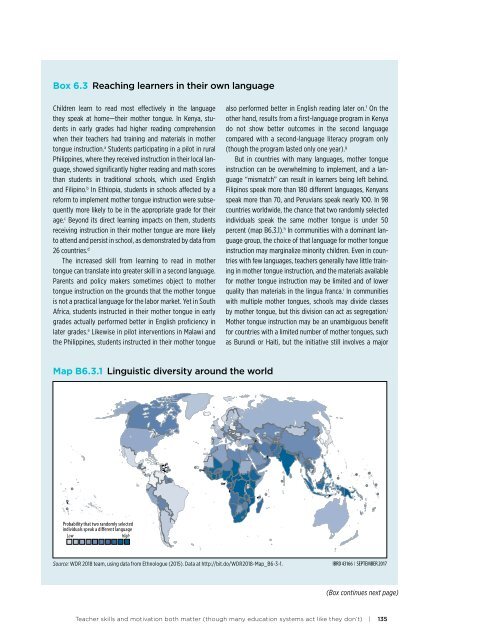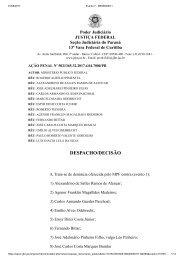Brasil só deve dominar Leitura em 260 anos, aponta estudo do Banco Mundial Relatorio Banco Mundial _Learning
You also want an ePaper? Increase the reach of your titles
YUMPU automatically turns print PDFs into web optimized ePapers that Google loves.
Box 6.3 Reaching learners in their own language<br />
Children learn to read most effectively in the language<br />
they speak at home—their mother tongue. In Kenya, students<br />
in early grades had higher reading comprehension<br />
when their teachers had training and materials in mother<br />
tongue instruction. a Students participating in a pilot in rural<br />
Philippines, where they received instruction in their local language,<br />
showed significantly higher reading and math scores<br />
than students in traditional schools, which used English<br />
and Filipino. b In Ethiopia, students in schools affected by a<br />
reform to impl<strong>em</strong>ent mother tongue instruction were subsequently<br />
more likely to be in the appropriate grade for their<br />
age. c Beyond its direct learning impacts on th<strong>em</strong>, students<br />
receiving instruction in their mother tongue are more likely<br />
to attend and persist in school, as d<strong>em</strong>onstrated by data from<br />
26 countries. d<br />
The increased skill from learning to read in mother<br />
tongue can translate into greater skill in a second language.<br />
Parents and policy makers sometimes object to mother<br />
tongue instruction on the grounds that the mother tongue<br />
is not a practical language for the labor market. Yet in South<br />
Africa, students instructed in their mother tongue in early<br />
grades actually performed better in English proficiency in<br />
later grades. e Likewise in pilot interventions in Malawi and<br />
the Philippines, students instructed in their mother tongue<br />
also performed better in English reading later on. f On the<br />
other hand, results from a first-language program in Kenya<br />
<strong>do</strong> not show better outcomes in the second language<br />
compared with a second-language literacy program only<br />
(though the program lasted only one year). g<br />
But in countries with many languages, mother tongue<br />
instruction can be overwhelming to impl<strong>em</strong>ent, and a language<br />
“mismatch” can result in learners being left behind.<br />
Filipinos speak more than 180 different languages, Kenyans<br />
speak more than 70, and Peruvians speak nearly 100. In 98<br />
countries worldwide, the chance that two ran<strong>do</strong>mly selected<br />
individuals speak the same mother tongue is under 50<br />
percent (map B6.3.1). h In communities with a <strong>do</strong>minant language<br />
group, the choice of that language for mother tongue<br />
instruction may marginalize minority children. Even in countries<br />
with few languages, teachers generally have little training<br />
in mother tongue instruction, and the materials available<br />
for mother tongue instruction may be limited and of lower<br />
quality than materials in the lingua franca. i In communities<br />
with multiple mother tongues, schools may divide classes<br />
by mother tongue, but this division can act as segregation. j<br />
Mother tongue instruction may be an unambiguous benefit<br />
for countries with a limited number of mother tongues, such<br />
as Burundi or Haiti, but the initiative still involves a major<br />
Map B6.3.1 Linguistic diversity around the world<br />
Probability that two ran<strong>do</strong>mly selected<br />
individuals speak a different language<br />
Low<br />
High<br />
Source: WDR 2018 team, using data from Ethnologue (2015). Data at http://bit.<strong>do</strong>/WDR2018-Map_B6-3-1. IBRD 43166 | SEPTEMBER 2017<br />
(Box continues next page)<br />
Teacher skills and motivation both matter (though many education syst<strong>em</strong>s act like they <strong>do</strong>n’t) | 135








